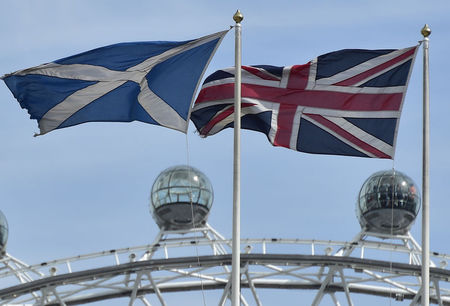By Alistair Smout
GLASGOW (Reuters) - A split in Scotland's business elite over independence widened on Thursday, with supporters of secession arguing the economic benefits of going it alone after a rival group had sung the praises of staying in the United Kingdom.
Many companies, large and small, had previously refused to take sides in the highly-charged debate, but with just three weeks to go until the Sept. 18 referendum, an increasing number of influential figures are coming off the fence.
On Thursday, a group of 200 Scottish business leaders, including Stagecoach head Brian Souter and engineering tycoon Jim McColl of Clyde Blowers, joined forces in a newspaper letter to back Scotland's breakaway.
A day earlier, 130 business leaders, among them the heads of BHP Billiton, temporary power provider Aggreko and HSBC bank, signed an open letter opposing independence, voicing fears of its impact on business.
Latest opinion polls show support for independence has gained ground, but is still trailing the pro-union camp.
After spending much of the campaign on the sidelines, British Prime Minister David Cameron was also set to re-enter the fray on Thursday, making a rare foray into Scotland to argue against ending the 307-year union with England and Wales.
Business leaders backing independence said successive London governments had failed to pay heed to the interests of the $250 billion (150 billion pound) economy north of the border, which accounts for about 10 percent of the British economy, boosted by North Sea oil and a strong financial services sector.
"The tax raids on our oil industry and pensions funds by Labour and Conservative-led governments are clear examples of a short-term focus rather than a long-term strategy," said the letter published in Glasgow newspaper the Herald.
"Scottish industry is so often treated as a cash cow rather than a strategically important part of a more prosperous and fairer society."
Nationalist leader Alex Salmond, head of the Scottish National Party, welcomed the letter and recognition of the need for Scotland to be given powers to boost its economy and jobs.
"People's jobs are at the heart of this referendum campaign as people want to know that Scotland will get the powers that will attract investment and create employment opportunities," Salmond said in a statement
Salmond triumphed in a televised debate this week against Alistair Darling, the head of the pro-union "Better Together" camp, but pollsters questioned whether this would be enough to boost his chances of victory next month.
DIVISION WIDENS
The most recent "poll of polls", on Aug. 15, which was based on an average of the last six polls excluding undecided respondents, found support for a breakaway stood at 43 percent against 57 percent for remaining within the United Kingdom.
Business leaders arguing Scotland should stay in the United Kingdom said nationalists had failed to make the business case for a breakaway and should instead opt for greater powers for Scotland's devolved parliament in the capital Edinburgh.
A number of questions remain over the financial and economic arrangements of an independent Scotland, including what currency it would use, EU membership, and the future of North Sea oil.
While the pro-independence letter had more signatories, those warning against a split represent larger companies. Both letters were signed by bosses employing around 50,000 people in Scotland, although they have been signed in a personal capacity.
Organisers of the letter opposing independence said some businesses that supported their position declined to sign, wary of backing the pro-union campaign publicly.
Also wary of a backlash, Cameron has taken a low-profile role in the campaign, aware his privileged English background has limited appeal in Scotland, where his Conservative party has only one of Scotland's 59 seats in the London parliament.
But with nationalists starting to gain some ground in polls before the referendum, Cameron will travel to Glasgow to argue Scotland is better off as part of a large domestic market with a shared currency, and common taxes and regulations.
"This is one of the oldest and most successful single markets in the world," Cameron will tell business leaders in Glasgow, Scotland's largest city, on Thursday.
"Scotland does twice as much trade with the rest of the UK than with the rest of the world put together ... trade that helps to support one million Scottish jobs."
Cameron has said he will not quit in the event of a "Yes" vote to try to stop Scots using the vote to punish him.
But one cabinet member, Secretary for Scotland Alistair Carmichael, has indicated he would resign after a vote for independence to be part of the team negotiating terms ahead of Scotland becoming independent in March 2016.

"If Scotland votes for independence then I will still want to be part of Scottish public political life," he told the Scotsman newspaper.
(Reporting by Alistair Smout, Writing by Belinda Goldsmith; Editing by Crispian Balmer)
